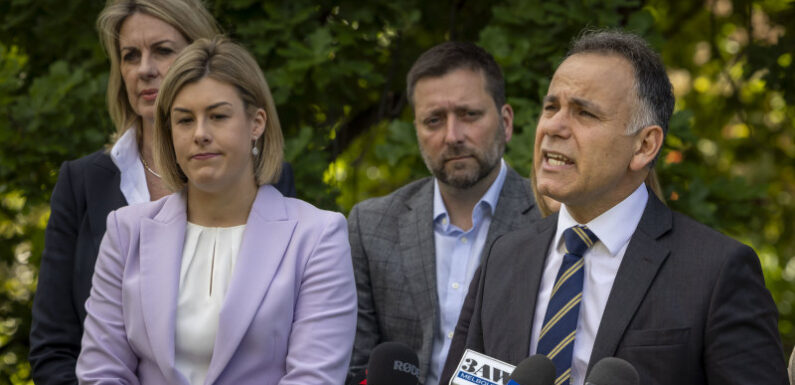
Save articles for later
Add articles to your saved list and come back to them any time.
As imperfect as the handover from Daniel Andrews to Jacinta Allan has been – the caucus blow-up over the deputy leader’s position and the cack-handed announcement of a crackdown on land-banking being the clumsy highlights – it has gotten off to a reasonable start.
In the space of a week, Allan has reshuffled the Cabinet, and nominated housing and children as her government’s policy priorities. We’ll have to see if Allan keeps her word, but she is taking her government in the right political direction.
John Pesutto announces his new shadow cabinet this week.Credit: Wayne Taylor
If there has ever been a time when a majority of the voting public is open to big and possibly radical action on the housing crisis, it’s now.
Inevitably, there will be pushback, outrage, and that common feature of modern debate, academics claiming they know a better way to do it, but housing is an enormous equity and economic opportunity issue, especially for those aged under 40. At the very least, those voters are likely to give the Allan government marks simply for elevating the issue and trying to tackle it. If they do, it will conform with the recent behaviour of Victorian voters, who have over the past nine years been consistently, and sometimes incredibly, forgiving of the Labor government.
The Andrews government oversaw massive stuff-ups – to wit, the East West Link payment, Commonwealth Games fiasco, and hotel quarantine – but did not suffer. Instead, it established a reputation for delivering on its promises, echoing the experience of the Bracks government earlier this century. This contrasted mightily with the mostly directionless Coalition Abbott, Turnbull, and Morrison governments in Canberra, to Victorian Labor’s great advantage.
It also looked good compared with the previous time the Liberal Party ruled in Victoria in 2010-14 under Ted Baillieu and Denis Napthine. The party has never really come to grips with just how badly it blew its opportunity to restore its reputation in that time by being so underwhelming. The failure to face up to the fact that being tipped out after just one term was a disaster demanding serious remedial work on policies and personnel has hampered the Liberals ever since.
Too many in the Liberal Party still see the Victorian political environment as a level playing field, where they’re just one attack line away from fatally wounding the government. It’s a fantasy that ultimately only hurts them. Since the Liberals under Dick Hamer won the 1979 election, there have been 12 state elections. Labor has won nine, the Liberals three.
That’s why the Liberals’ focus from now needs to be on what they’ve got to offer. Just serving up a critique of the other side – no matter how acidic or accurate – clearly has not worked. The most recent RedBridge poll had the government ahead of the opposition 56.5 per cent to 43.5.
Surely now is the moment for the Libs and their media cheerleaders to conclude that they’ll only bring about a change of government by dropping the knee-jerk criticism and concentrating on developing their own policy offerings. They should be worried about the government’s housing policy and Allan’s determination to implement it.
Denying themselves the temptation of going for the obvious line requires hard work and a lot of self-discipline. On Tuesday, shadow treasurer Brad Rowswell slammed the expansion of the tax on unused and undeveloped residential properties as nothing but a new impost on Victorians. He said, “Victoria is broke and Labor’s only plan for ‘economic growth’ is to tax Victorians more.” Rowswell cannot possibly mean it when he says the state is broke. If it’s broke because it carries a large amount of debt, then most households and businesses are broke too.
Premier Jacinta Allan has listed housing and childcare as her priority issues.Credit: Eamon Gallagher
It’s hard to see how the overheated rhetoric helps. The joining up of the words “Labor” and “debt” used to be a sure-fire election winner for the Liberals, but the pandemic changed Australians’ attitude to government debt, at least for a while. Victoria’s debt is routinely characterised as disastrous, but most Victorians don’t see it that way. They know the Morrison government took the nation’s finances deep into debt during the pandemic, with very little protest from the media.
There’s no question that the state government will, because of its indebtedness, have to make a lot of tough decisions that will hurt or disappoint some Victorians, but these are unlikely to shift voter sympathies sufficiently. What will give the opposition a better chance at changing perceptions is a series of policies that show it knows how to be positive rather than carping.
The historical examples are there. Steve Bracks as opposition leader pulled off a miracle win by refusing to talk about or respond to Jeff Kennett. Instead, he concentrated on Labor’s policies, a strategy the Liberals regarded as hilarious – until election night. Chris Minns in New South Wales won office this year by playing Mr Nice. Offering up a pithy zinger can win an opposition MP 15 seconds on the evening news, but it’s less likely to win them a place on the government benches.
Shaun Carney is a regular columnist.
The Opinion newsletter is a weekly wrap of views that will challenge, champion and inform your own. Sign up here.
Most Viewed in National
From our partners
Source: Read Full Article

